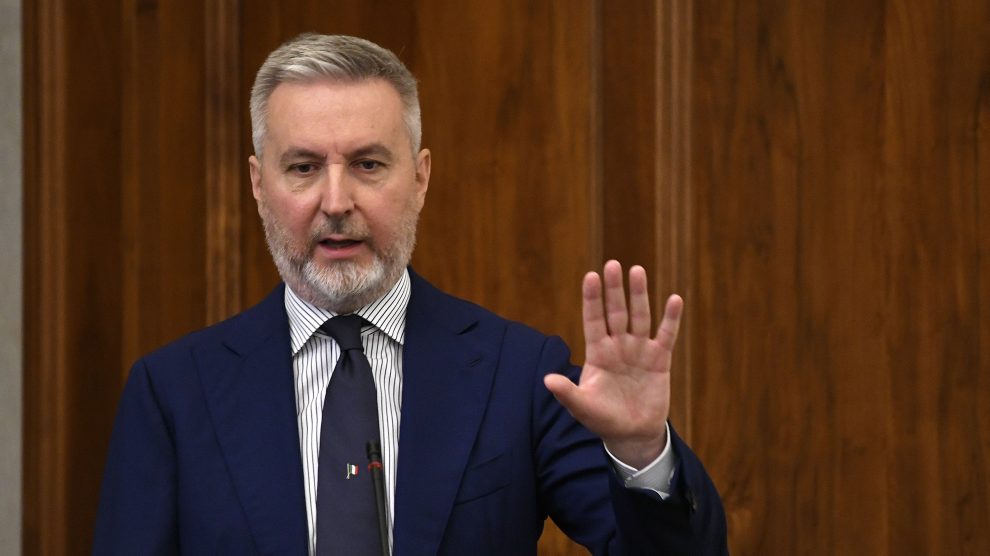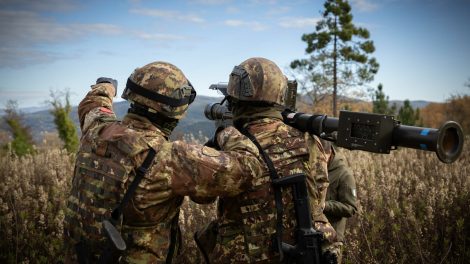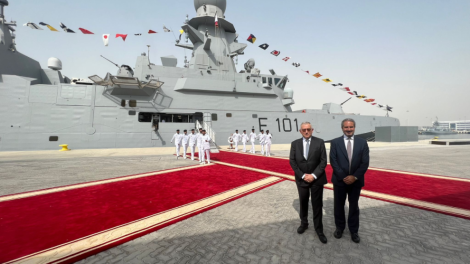In Ukraine, Italy will play its part alongside NATO, balancing deterrence and negotiation, the military instrument and diplomacy. “The Alliance has planned to strengthen the deterrence measures on its eastern flank. Italy, too, participates in this [effort] within the framework of means of operations and missions that Parliament has already authorised,” Lorenzo Guerini, defence minister, told Repubblica.
“If further decisions are taken within the NATO deterrence strategy, Italy will give its further contribution and will do its part, reaffirming the value of the Alliance’s cohesion and starting by reassuring member countries on the eastern flank,” he added.
As the Italian paper pointed out, Italian armed forces have been participating for years in the Atlantic Alliance’s operations on the hottest fronts, where Moscow’s pressure is felt most incisively. They have patrolled the skies over the Baltic and Iceland, they have sent troops and vehicles to the Polish, Norwegian and Romanian polygons to improve integration between NATO armies, and they continue to guard the Mediterranean routes marked by growing tension.
The Italian Navy is also involved in the allied task force that patrols the eastern Mediterranean. Within hours the confrontation could intensify, along with a series of parallel exercises. Among these is Operation Neptune Strike, under the guidance of NATO headquarters in Naples, involving three aircraft carriers: Italy’s Cavour, the US’ Truman and France’s De Gaulle.
With regard to Ukraine, Italy’s commitment is now worth 78 million euros according to the Milex observatory, which monitors Italian military spending.
The role of Italian forces. General Hodges speaking
“There are so many ways Italy can make a difference” in Ukraine, Ben Hodges, a retired US general and former supreme commander of the US military in Europe from 2014 to 2018, told Decode39.
General Hodges spoke of air patrol operations in the Black Sea and the Baltics, as well as the rotating NATO naval operations. Moreover, he mentioned “the crucial role of NATO’s United Forces Command in Naples, which also oversees security in the Black Sea in addition to the Mediterranean.”
“The Italian armed forces always manage to bring additional value in terms of experience and capabilities. They can do so even more on NATO’s eastern flank and in the Black Sea, especially in Romania, where France has sent a battalion. I hope Italy will join in.”
Wooing the companies: the Italian-Russian companies’ conference
Vladimir Putin, President of the Russian Federation, is due for a videoconference with Italian business leaders on January 26. Even as the Ukrainian crisis rages on, and while the United States and the European Union are readying drastic sanctions and countermeasures against Russia.
The event is promoted by the Italian-Russian Chamber of Commerce, chaired by Vincenzo Trani, of Mikro Kapital Group, in collaboration with the Italian-Russian Entrepreneurial Committee presided by Marco Tronchetti Provera, CEO of Pirelli.
“The discussion will focus on current aspects of trade, economic and investment cooperation between Russia and Italy, as well as the prospects for further expansion of business ties between entrepreneurs from the two countries,” said the Kremlin in a note about the event.
“Special attention will be given to opportunities for building up cooperation in energy, industry, finance and environmentally friendly technologies.”
Trade between Russia and Italy soared by almost 44% in the first nine months of 2021 compared to the same period last year, reaching a value of just over 20.2 billion euros.
“There’s no doubt [Mr] Putin is going to talk about losses for the Italian economy if Rome supports sanctions against Russia promised by the West in case of a new attack on Ukraine,” argued Olga Tokariuk, non-resident fellow at CEPA, an American think tank. “In fact, many Italian businesses don’t need to be persuaded to side with Russia: they already do.”
The gov’t is having none of it (while some CEOs are)
However, the Italian government and diplomatic institutions have distanced themselves from the event. Diplomatic sources have explained to Adnkronos that the event is a “private initiative only”.
Moreover, they stressed that the meeting “will not be attended by the Italian ambassador” in Moscow, Giorgio Starace, nor any “referent of the Ministry of Foreign Affairs.”
The government has also spoken of private initiatives and the activation of a moral suasion strategy towards the companies that are participated by the State. Thus, Claudio De Scalzi, managing director of Eni, will be absent.
Over to the other side, Francesco Starace, CEO of Enel (and brother of the Italian ambassador in Moscow), declined the State’s efforts and is poised to be in attendance. The same goes for Antonio Fallico, chief of the Russian division of Intesa Sanpaolo, a major bank, and president of the Conoscere Eurasia association.
Lately, the Italian bank UniCredit is reportedly interested in taking over Otkritie Bank, the seventh Russian institution by size. But that interest has been swiftly set aside, partly due to geopolitical tensions. CEO Andrea Orcel has been named as a possible attendee.
In Italy, as in the US, large companies are asking the government to be cautious on sanctions and countermeasures against Russia over the Ukraine crisis. The Biden administration and Congress need to “get the details right in case they have to follow through on the threat of sanctions,” Jake Colvin, president of the National Foreign Trade Council, told Reuters.
It’s about pressure groups. Analysis by Nona Mikhelidze (IAI)
Faced with such an eventuality, how will the West react? Will the threat of sanctions apply even in the case of formal Russian recognition of the Ukrainian separatist areas? Would giving legitimacy to the self-proclaimed republics be interpreted as aggression?
The answer to these questions is tied to the purpose with which Mr Putin will attend the meeting with the Italian business community, according to Nona Mikhelidze, a researcher at the Italian Institute of International Affairs (IAI), a Rome-based think tank.
“The Russian president intends to prepare the ground for these kinds of minor incursions, in front of which he hopes to elicit a more controlled reaction from the Western system,” the expert told Decode39.
“And so, in deepening those contacts with figures inside the various countries — such as with the Italian corporate and industrial world — [Mr] Putin seeks direct interlocution with power blocs that can pressure governments and push them to take more nuanced positions about such minor incursions.” However, this would give leeway to the positive emergence of the Russian president’s narrative, she concluded.
[Mr Putin] expects that big business can weaken the West’s Russia policy”, added Alexander Gabuev, a senior fellow at the Carnegie Moscow Centre, a think tank, speaking to the Financial Times. “This was his approach to Germany and the whole of Europe — right now it seems they see Italy as a weak link in the EU that he can influence so that they push to weaken European sanctions policy if there’s a serious military escalation in Ukraine.”Not so Russophile anymore
“Among European countries, Italy is probably the closest to Russia in terms of economic and cultural ties,” noted Aldo Ferrari, a Russia expert at the Italian Institute for International Political Studies (ISPI), a think tank, and professor at the Ca’ Foscari University in Venice, as quoted by Politico Europe.
However, the same outlet also points out that “the strong societal ties between Russia and Italy do not mean that Rome will oppose sanctions against Moscow as it did after the invasion of Crimea in 2014.”
The difference with 2014 is that Italian Prime Minister Mario Draghi “is a different proposition from Matteo Renzi, who led Italy in the aftermath of the Russian invasion of Crimea,” writes Politico.
Indeed, today Italy intends “to defend the sovereignty of all countries — in this case, Ukraine’s,” said Vincenzo Amendola, undersecretary for European Affairs, to SkyTg24.
Energy equals strategic risks. COPASIR’s stance
COPASIR, the Italian Parliament’s watchdog of the intelligence services, recently published a report on energy security stressing that the geopolitical factor is decisive in increasing the risks of excessive dependence on foreign supplies.
Members Enrico Borghi (Democratic Party), Federica Dieni (Five Star Movement) and Elio Vito (Forza Italia) called the entrepreneurs’ meeting taking place in the current scenario a “singular” instance.
While understanding “the need for our companies to maintain good business relations with Russian companies,” the cross-partisan trio underscored their belief that the meeting “cannot compromise Italy’s transatlantic reliability – especially in times of great tension, such as this -, and the full sharing of decisions that will be taken with our historical Western allies, including developments in the Ukrainian crisis.”





